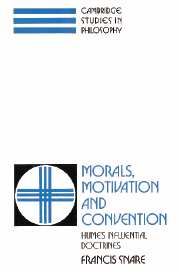Book contents
- Frontmatter
- Contents
- Acknowledgements
- NOTE
- Introduction
- Part I The argument for sentimentalism
- Part II The problems and consequences of sentimentalism
- 6 Continuity and circularity
- 7 The problem with justice
- 8 The conservative theory of justice
- 9 Convention and institutional facts
- 10 Convention and the regard to justice
- Bibliography
- Index
9 - Convention and institutional facts
Published online by Cambridge University Press: 05 June 2012
- Frontmatter
- Contents
- Acknowledgements
- NOTE
- Introduction
- Part I The argument for sentimentalism
- Part II The problems and consequences of sentimentalism
- 6 Continuity and circularity
- 7 The problem with justice
- 8 The conservative theory of justice
- 9 Convention and institutional facts
- 10 Convention and the regard to justice
- Bibliography
- Index
Summary
Hume's account of ‘convention’, first surveyed in Chapter 8 above and pursued in Chapter 10 below, is one which seems to employ no moral or normative notions (not even within opaque contexts such as belief contexts). Also, it seems to be an account which would satisfy most naturalists and methodological individualists (whom we would expect to have accounts of the basic psychological notions Hume employs). These two features of Hume's account are necessary for the success of Hume's ‘two reductive projects’ both of which employ the notion of ‘convention’. The first, the main, project is to give an account of‘the regard to justice as such’, i.e., the sentiment involved in the moral judgments which pose the ‘hard cases’ for Hume's sentimentalism. The notion of ‘convention’ employed within the account of this sentiment must be in turn explicable without recourse to the very moral notions (e.g. ‘just’, ‘right’, ‘wrong’) which that sentiment is used to explain. A ‘normfree’, a ‘value-free’, account of ‘convention’ is necessary to avoid the circle of sentimentalism. Whether this particular employment of a suitable notion of‘convention’ can avoid the specification circle of sentimentalism will be taken up in Chapter 10. The second reductive project, however, is the topic of this chapter.
THE REDUCTION OF INSTITUTIONAL FACTS
A plausible metaphysical naturalism requires some account of institutional facts, facts such as, in our society, contracts, property, legal institutions, etc., but in other societies such things as status or kinship rights and obligations.
- Type
- Chapter
- Information
- Morals, Motivation, and ConventionHume's Influential Doctrines, pp. 246 - 282Publisher: Cambridge University PressPrint publication year: 1991

